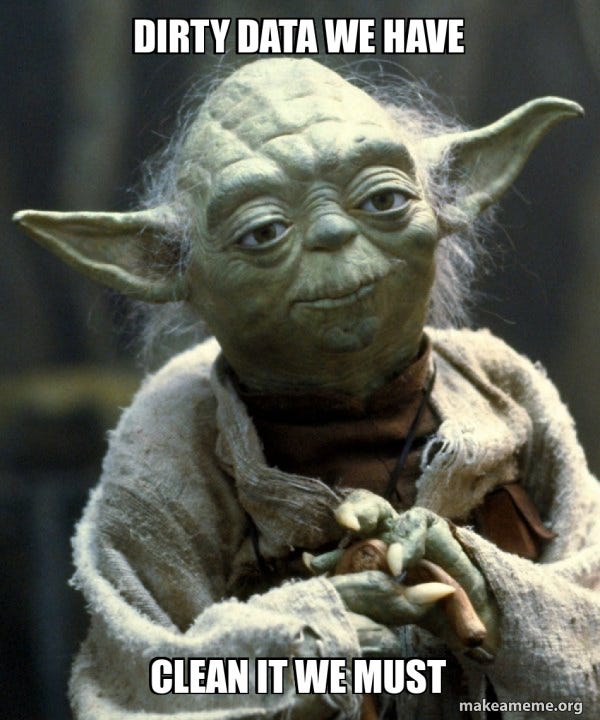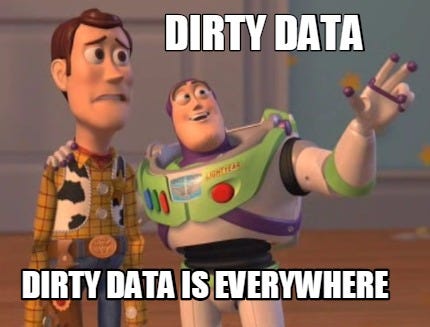Data is Not an Excuse
Nobody's got clean data
I hear it in every transformation project: "We can't move forward because our data isn't clean enough." Let me let you in on a dirty little secret - nobody's data is clean enough. Not yours, not your competitors', not even the Fortune 500 companies with massive IT departments and armies of Data Analysts.
Hell, I use AI in everything. I used it to help me write this article. AI doesn’t even have clean data - it’s trained on the internet, and if you think the internet is clean, I’ve got a bridge in Brooklyn to sell you.
The Universal Truth About Data
Now, I'm not saying clean data isn't important—it's vital, and you'll eventually need it. But data doesn't start out clean, and if you're waiting for perfect data instead of rolling up your sleeves and getting dirty with what you have, you'll never make progress.
Data, by its very nature, is messy. It's imperfect. It lies. It contradicts itself. This isn't a flaw in your systems or a failure of your team - it's just the reality of capturing information about the messy, imperfect, real world we operate in.
Using "bad data" as an excuse to avoid transformation is, at best, lazy thinking. At worst, it's a complete abdication of your responsibility to drive insights and value for your business partners.
People always think that data is holding them back, when in reality their broken processes are what is leading to horrible data.
A Better Approach: Start with Decisions
Instead of obsessing over perfect data, start with the decisions you need to make:
Need to forecast sales? Start with the sales data you have, even if it's incomplete. Unpacking what you have tends to lead to getting cleaner data.
Planning inventory? Focus on demand patterns, even if they're noisy. Bringing attention to the noise tends to hone the process which in turn hones your data.
Managing cash flow? Begin with your balance sheet, even if reconciliations aren't perfect. Work your reconciliation process and the cash flow process gets cleaner.
The Elephant Strategy
You don't eat an elephant all at once - you take it one bite at a time. The same is true for data transformation:
Identify one critical business decision
Map the minimum data needed for that decision
Clean and organize that data and ONLY that data
Build processes around maintaining that specific dataset
Move to the next priority
Pro Tip: Don't try to boil the ocean by implementing massive data platforms before you've proven value with smaller, targeted wins.
The Clean Enough Fallacy
There's a persistent myth in business that "if our data was just cleaner, everything would be easier." While clean data does make life easier, it's a moving target. There's no magical threshold where data becomes "clean enough." Your data can always be cleaner, more detailed, more current.
I've worked with companies of all sizes - while some had cleaner data than others, they all believed their data sucked. Bottom line: there's no such thing as perfectly clean data.
Consider this: Your competitors likely have better data than you in some areas and worse data in others. Some of your business units probably have cleaner data than others. Yet somehow, successful businesses still make decisions every day with imperfect information. Your job is to arm them with the most valuable data in the right context and timeframe to make sound, actionable decisions.
The Path Forward
Here's how to break free from the "bad data" paralysis:
Start with your goal - what decision needs to be made?
Take inventory of available data - what do you have vs. what do you need?
Focus on efficiency - how can you clean and maintain just the critical data points?
Build iterative improvements - create processes that make the data incrementally better over time
The Bottom Line
Perfect data is a myth. Waiting for perfect data before taking action is a recipe for stagnation. Start with the decisions you need to make, use the data you have, and build processes to make it better over time.
Remember: The goal isn't perfect data - it's better decisions. Don't let the pursuit of perfection prevent you from making progress.
Ready to transform your data approach?
Subscribe to my newsletter. It’s full of insights on how to turn messy data into actionable business decisions. You can also book a session with me directly where we’ll assess your current challenges and develop a practical roadmap for making progress today!



